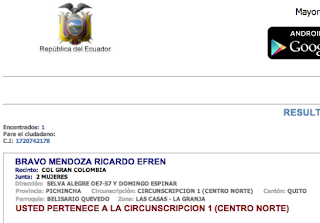Traducción de Anaraa Njandorch
February 17, 2013 was an important day for Ecuadorians of diverse sex/gender conditions. In a fit impossible ten years ago, we went to the polling booths to exercise our rights in terms of political participation and aesthetic freedom enshrined in the Constitution with our gender identities and corresponding documents.

Ricardo Bravo is a transman, and Carolina Avarado, a transwoman. They are alike in some ways, and different in others: the guy is a young student who is in college, something made possible thanks to the huge advances in relation to the implementation of transpeople’s human rights in Ecuador. He lives in an enabling context of open educational and employment opportunities. The woman is older. She is a sex worker who came out as a transwoman at the time of fewer opportunities, but who is now able to enjoy better days. Both are activists. Both have changed their legal names in their civil registry (possible since 2007, further strengthened with the establishment of the right to free choice of one’s name in the Constitution of 2008). Today the names of Ricardo and Carolina reflect their respective identities, male and female. However, Ricardo still hasn’t been able to change his gender marker in the civil registry, while Carolina is already a woman in the eye of the law. For that reason, Ricardo voted at a booth for women and so did Carolina. Ricardo's trans identity goes unnoticed while Carolina's is proudly visible. Hence, both their presences at women's booths are surprising some way or other. The legal situation of Ricardo, incidentally, is still inconsistent with his constitutional right to privacy. Fortunately, as an empowered activist, he can politicize the sex/gender mismatch between the name and the gender marker on his ID card. In any case, both Carolina and Ricardo, their gender identities and their legal statuses stand for the importance of moving towards a full respect of gender in personal documents: something that the campaign "My Gender on my ID" has been working steadily through presenting in 2012 a draft amendment to the Civil Registration Act that has already successfully passed first reading in the Parliament of Ecuador.

Today is an important day for people of diverse sex/gender conditions. The exercise of polical rights we have displayed today is doubly political in its significance.









